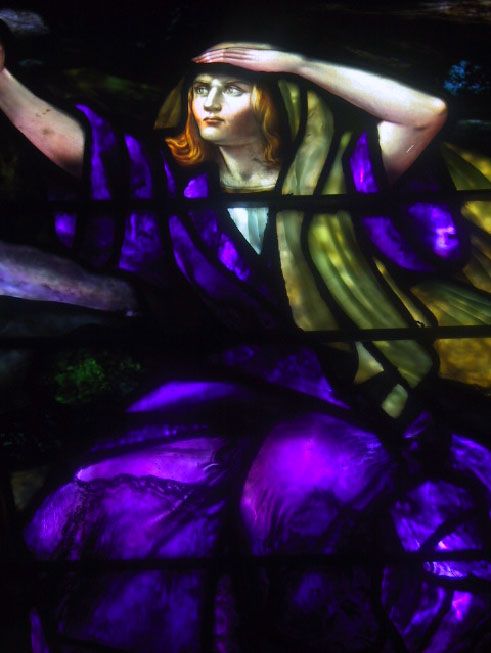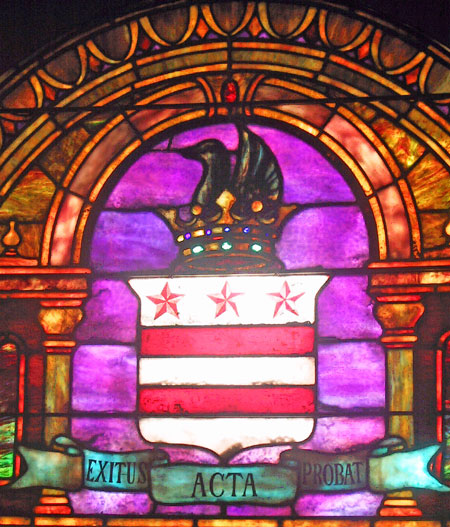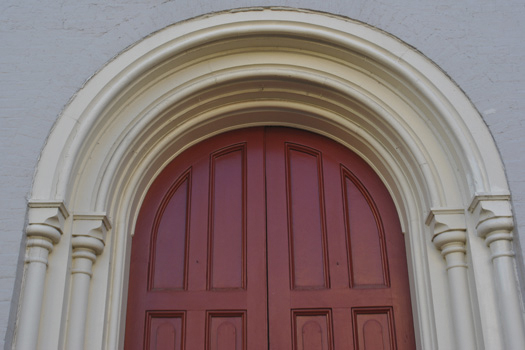
Dedication: To the memory of Mary Ball Washington, Mother of George Washington, by the Daughters of the American Revolution
Inscription: “And Deborah Said Unto Barak, Up, For The Lord Hath Delivered Sisera Into Thine Hand: Is Not The Lord Gone Out Before Thee? So Barak Went Down From Mount Tabor, and Ten Thousand Men After Him”
Maker/Date: Colgate Art Glass Co., New York, 1907
Description : The window is unique at St. George’s as it is the only one with an Old Testament theme and also the only one with a female main character. The window was designed by the Colgate Art Glass Company of New York who also created Jesus and the Children on the left or north side of the Church. They were both dedicated in 1907.
The subject of the window is the defeat of Canaanites under the prophetic leadership of Deborah and the military leadership of Barak, is related in the Book of Judges prose (chapter 4) and repeated in poetry (chapter 5, which is known as the Song of Deborah). It depicts events in the 12th century BC.
Background
The people of Israel are now in the Promised Land. Slavery and their forty-year wilderness sojourn are behind them. Canaan included what today are Lebanon, Israel, Palestine, northwestern Jordan, and some western areas of Syria. It is the 12th century BC.
They are also the enemies of the native Canaanites. The Canaanites, the native people in the land, have oppressed the Israelites cruelly for twenty years under King Jabin of Canaan and his general Sisera. The Israelites are behind the Canaanites in technological innovation. They are still in the Bronze Age, while the Canaanites have advanced to the next age, the iron age, as evidenced by nine hundred iron chariots
Enter Deborah was a prophetess and the fourth, and the only female judge. Deborah prevailed upon Barak to face , the commander of Jabin’s army, in battle. The window depicts Deborah pleading with Barak to lead the Israelites against Sisera. She was known for her wisdom and ability to negotiate peace. She will insure that her people have peace and can prosper, and so she is willing to go to war to accomplish this goal.
Barak agreed to the battle only after Deborah agreed to accompany him into battle. Deborah’s forces moved down from Kadesh in the mountains, the enemy moved north, taking the southern route up to where the battle was fought near Mt. Tabor in the North.
The Israeli force mounted 10,000 men against Sisera’s force of nine hundred iron chariots. In the battle at , a cloudburst occurred, causing the river to flood, thus limiting the maneuverability of the 900 iron Canaanite chariots. Sisera fled, seeking refuge in the tent of a Kenite woman, . Jael gave Sisera a drink of milk and he fell asleep from weariness. Then she pounded a tent peg through his head. When Barak came along, she let him see Sisera dead in her tent. Later Israel slew King Jabin.
Techniques – Barak in the window appears somewhat reluctant to take up the cause, looking downward as Deborah obviously is agitated. The bright purples illuminate her main role in the window as well the light color of her skin. She is pointing to Mt. Tabor in the background. Her expression is serious with a starring glance toward the mountainous and her hand on her head to help gain a better glance. Barak is distinguished with contrasting greens. Colgate’s colors are dark The mountainous terrain is obvious and appears as one uniform whole. The sky appears ominous with the obvious advantage of the Canaanites. The styling is medieval with many small pieces of glass.

The design of the Washington Coat of Arms (three red stars over two horizontal red bars on a white field) is often said to have inspired the Stars and Stripes flag and has been used since 1938 as the coat of arms and flag of the District of Columbia. It is also found on the Purple Heart. The shield is topped with a crown and bird. The phrase “Exitus Acta Probat” is Latin for “the result validates the deeds” or, more accurately, “the ends justify the means.”
